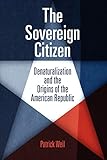The Sovereign Citizen : Denaturalization and the Origins of the American Republic / Patrick Weil.
Material type: TextSeries: Democracy, Citizenship, and ConstitutionalismPublisher: Philadelphia : University of Pennsylvania Press, [2012]Copyright date: ©2013Description: 1 online resource (296 p.)Content type:
TextSeries: Democracy, Citizenship, and ConstitutionalismPublisher: Philadelphia : University of Pennsylvania Press, [2012]Copyright date: ©2013Description: 1 online resource (296 p.)Content type: - 9780812222128
- 9780812206210
- Citizenship -- United States -- History -- 20th century
- Citizenship -- United States -- History -- 20th century
- Citizenship, Loss of -- United States -- History -- 20th century
- Citizenship, Loss of -- United States -- History -- 20th century
- Expatriation -- United States -- History -- 20th century
- Expatriation -- United States -- History -- 20th century
- Human Rights
- POLITICAL SCIENCE / Civil Rights
- Human Rights
- Law
- Political Science
- Public Policy
- 342.7308/3 23
- KF4715 .W45 2013
- online - DeGruyter
- Issued also in print.
| Item type | Current library | Call number | URL | Status | Notes | Barcode | |
|---|---|---|---|---|---|---|---|
 eBook
eBook
|
Biblioteca "Angelicum" Pont. Univ. S.Tommaso d'Aquino Nuvola online | online - DeGruyter (Browse shelf(Opens below)) | Online access | Not for loan (Accesso limitato) | Accesso per gli utenti autorizzati / Access for authorized users | (dgr)9780812206210 |
Frontmatter -- Contents -- Introduction -- Part I. The Federalization of Naturalization -- Chapter 1. Denaturalization, the Main Instrument of Federal Power -- Chapter 2. The Installment of the Bureau of Naturalization, 1909-1926 -- Chapter 3. The Victory of the Federalization of Naturalization, 1926−1940 -- Part II. A Conditional Citizenship -- Chapter 4. The First Political Denaturalization: Emma Goldman -- Chapter 5. Radicals and Asians -- Chapter 6. In the Largest Numbers: The Penalty of Living Abroad -- Chapter 7. The Proactive Denaturalization Program During World War II -- Part III. War in the Supreme Court -- Chapter 8. Schneiderman: A Republican Leader Defends a Communist -- Chapter 9. Baumgartner: The Program Ends, but Denaturalization Continues -- Chapter 10. A Frozen Interlude in the Cold War -- Chapter 11. Nishikawa, Perez, Trop: "The Most Important Constitutional Pronouncements of This Century" -- Chapter 12. American Citizenship Is Secured: "May Perez Rest in Peace!" -- Conclusion -- Appendix 1. Emma Goldman, "A Woman Without a Country" From Mother Earth (1909) -- Appendix 2. Chiefs of the Naturalization Bureau and Evolution of Departmental Responsibilities -- Appendix 3. Naturalization Cancellations in the United States, 1907−1973 -- Appendix 4. Americans Expatriated, by Grounds and Year, 1945−1977 -- Appendix 5. Supreme Court and Other Important Court Decisions Related to Denaturalization and Nonvoluntary Expatriation from Schneiderman and Participating Supreme Court Justices -- Notes -- Archival Sources and Interviews -- Index -- Acknowledgments
restricted access online access with authorization star
http://purl.org/coar/access_right/c_16ec
Present-day Americans feel secure in their citizenship: they are free to speak up for any cause, oppose their government, marry a person of any background, and live where they choose-at home or abroad. Denaturalization and denationalization are more often associated with twentieth-century authoritarian regimes. But there was a time when American-born and naturalized foreign-born individuals in the United States could be deprived of their citizenship and its associated rights. Patrick Weil examines the twentieth-century legal procedures, causes, and enforcement of denaturalization to illuminate an important but neglected dimension of Americans' understanding of sovereignty and federal authority: a citizen is defined, in part, by the parameters that could be used to revoke that same citizenship.The Sovereign Citizen begins with the Naturalization Act of 1906, which was intended to prevent realization of citizenship through fraudulent or illegal means. Denaturalization-a process provided for by one clause of the act-became the main instrument for the transfer of naturalization authority from states and local courts to the federal government. Alongside the federalization of naturalization, a conditionality of citizenship emerged: for the first half of the twentieth century, naturalized individuals could be stripped of their citizenship not only for fraud but also for affiliations with activities or organizations that were perceived as un-American. (Emma Goldman's case was the first and perhaps best-known denaturalization on political grounds, in 1909.) By midcentury the Supreme Court was fiercely debating cases and challenged the constitutionality of denaturalization and denationalization. This internal battle lasted almost thirty years. The Warren Court's eventual decision to uphold the sovereignty of the citizen-not the state-secures our national order to this day. Weil's account of this transformation, and the political battles fought by its advocates and critics, reshapes our understanding of American citizenship.
Issued also in print.
Mode of access: Internet via World Wide Web.
In English.
Description based on online resource; title from PDF title page (publisher's Web site, viewed 24. Apr 2022)


